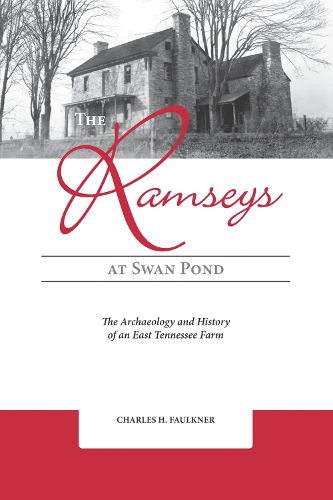Readings Newsletter
Become a Readings Member to make your shopping experience even easier.
Sign in or sign up for free!
You’re not far away from qualifying for FREE standard shipping within Australia
You’ve qualified for FREE standard shipping within Australia
The cart is loading…






The Ramsey House was built in 1797 for Col. Francis Alexander Ramsey, a prominent early settler of East Tennessee who, along with his two sons J. G. M. Ramsey and William B. A. Ramsey, shaped the physical and cultural landscape of what would become Knox county and Knoxville, Tennessee. The one-hundred-acre homestead, referred to by Colonel Ramsey as Swan Pond, contained the Ramsey home as well as other outbuildings and slave quarters. In 1952, the Association for the Preservation of Tennessee purchased the tract of land, and the Ramsey House is now listed on the National Register of Historic Places.
Charles H. Faulkner began archaeological investigations at the Ramsey House in 1985 and concluded his work with his retirement from the University of Tennessee’s anthropology department in 2005. During his tenure with the Ramsey House Archaeological Project, Faulkner and his team of scholars and students unearthed the prehistory of Native American occupation at Swan Pond, several outbuilding and early home foundation features yielding evidence of extensive early renovations to the Ramsey House and surrounding Swan Pond, and a multitude of ceramics and other artifacts left behind by the Ramsey family and other tenants ranging in dates from the late 1700s to the 1950s. Faulkner’s research presented in The Ramseys at Swan Pond reveals not only the material culture and family lifeways of early wealth in East Tennessee, but chronicles the occupation of a homestead that would become pivotal to the development of early Knoxville and Knox County and offers insights into the responsibilities Ramsey and his family undertook in order to tame an early American frontier.
Faulkner provides the reader a complete overview of the excavations, and emphasizes the importance of historic research within the discipline of archaeology in his introduction. The Ramseys at Swan Pond will be of interest to anyone studying historic archeology, the early American frontier, and Tennessee history.
$9.00 standard shipping within Australia
FREE standard shipping within Australia for orders over $100.00
Express & International shipping calculated at checkout
The Ramsey House was built in 1797 for Col. Francis Alexander Ramsey, a prominent early settler of East Tennessee who, along with his two sons J. G. M. Ramsey and William B. A. Ramsey, shaped the physical and cultural landscape of what would become Knox county and Knoxville, Tennessee. The one-hundred-acre homestead, referred to by Colonel Ramsey as Swan Pond, contained the Ramsey home as well as other outbuildings and slave quarters. In 1952, the Association for the Preservation of Tennessee purchased the tract of land, and the Ramsey House is now listed on the National Register of Historic Places.
Charles H. Faulkner began archaeological investigations at the Ramsey House in 1985 and concluded his work with his retirement from the University of Tennessee’s anthropology department in 2005. During his tenure with the Ramsey House Archaeological Project, Faulkner and his team of scholars and students unearthed the prehistory of Native American occupation at Swan Pond, several outbuilding and early home foundation features yielding evidence of extensive early renovations to the Ramsey House and surrounding Swan Pond, and a multitude of ceramics and other artifacts left behind by the Ramsey family and other tenants ranging in dates from the late 1700s to the 1950s. Faulkner’s research presented in The Ramseys at Swan Pond reveals not only the material culture and family lifeways of early wealth in East Tennessee, but chronicles the occupation of a homestead that would become pivotal to the development of early Knoxville and Knox County and offers insights into the responsibilities Ramsey and his family undertook in order to tame an early American frontier.
Faulkner provides the reader a complete overview of the excavations, and emphasizes the importance of historic research within the discipline of archaeology in his introduction. The Ramseys at Swan Pond will be of interest to anyone studying historic archeology, the early American frontier, and Tennessee history.